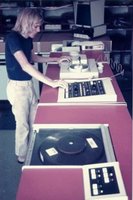Repeating History
I've been tidying up some of my things in my office and came across an old paper I used as a reference when I was writing my honours thesis back in 1996. The paper[1], written by Elizabeth O'Sullivan back in 1985, was talking about decision support systems (DSS) and contrasted them with the management information systems (MIS) of the 1960s and 70s.
A bit of history first.
MIS, in the 1960s were a disastrous failure. They were developed with the mindset that a techno-centric approach to management was the optimal means of making decisions. They collated data from transaction processing systems, and churned out reports on a regular basis (paper-based, since managers didn't have terminals on their desktops). The systems were designed to support the decision-making needs of all managers in an organisation. Developers at the time argued things like:
You might be thinking that these systems failed because they were working with machines that boasted a whopping 32kb of memory, and 8mb of disk storage, and reported using paper-based printouts. In fact, the reasons they failed had nothing to do with the technology or its limitations. This is from a paper by Russell Ackoff, again, writing in 1967:
Back to the paper I found. Here's an extract from the opening paragraphs:
[1] O'SULLIVAN, E. (1985) Decision Support Systems: An Introduction for Program Evaluators. Evaluation Review, 9(1), 84-92. (unfortunately, not available online).
MIS, in the 1960s were a disastrous failure. They were developed with the mindset that a techno-centric approach to management was the optimal means of making decisions. They collated data from transaction processing systems, and churned out reports on a regular basis (paper-based, since managers didn't have terminals on their desktops). The systems were designed to support the decision-making needs of all managers in an organisation. Developers at the time argued things like:
With so useful information captured ... we have attempted to make this as freely available as possible to sections of management that can use the information effectively. Past approaches, where special one time programs written by the Systems Department programmers (if they could get time) ...This appeared in a paper describing the Ford Motor Co.'s MIS approach in 1967. Sound familiar? It should. All of the things people were trying to achieve with MIS are the things they're trying to achieve now with BI and Data Warehousing. And it didn't work. Millions of dollars were spent and lost, and IT departments garnered a reputation that made business people question their hygiene, parentage and mental capacity.
You might be thinking that these systems failed because they were working with machines that boasted a whopping 32kb of memory, and 8mb of disk storage, and reported using paper-based printouts. In fact, the reasons they failed had nothing to do with the technology or its limitations. This is from a paper by Russell Ackoff, again, writing in 1967:
MIS are based on the following false assumptions:None of these have anything directly to do with the technology used. In other words, MIS failed because the developers didn't understand managers, the way they work, and the way they make decisions. The same mindset is still surprisingly common with BI.
- More information is better
- Managers don’t have the information they need
- Managers need the information they want
- Managers don’t have to understand a system to use it
Back to the paper I found. Here's an extract from the opening paragraphs:
[DSS] represent an attitude that management information systems (MIS) can and should do more than serve routine organizational operations... To support decision making effectively, a DSS must be flexible, user friendly, and interactive. It should go beyond traditional MIS, ... [it] must recognize and accomodate individual problem-solving styles...DSS were phenomenally successful at the time in comparison to MIS. The reason for this is the attention paid to individual decision-support. The same holds true for BI today. There is no way BI will work unless developers understand decision-making as a human process, and pay attention to helping individual decision-makers with tailored support. Unfortunately, this attitude, prevalent in the 1980s DSS movement and key to its success, appears to be missing from today's vendors, and the majority of developers.[Emphasis is mine]
[1] O'SULLIVAN, E. (1985) Decision Support Systems: An Introduction for Program Evaluators. Evaluation Review, 9(1), 84-92. (unfortunately, not available online).

1 comment:
Awesome blog you have heree
Post a Comment